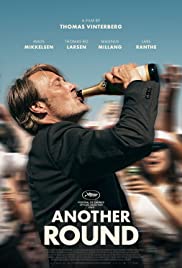
ANOTHER ROUND/ DRUK
Denmark, 2020, 117 minutes, Colour.
Thomas Bo Larsen, Magnus Millang, Lars Ranthe, Maria Bonnevie.
Directed by Thomas Vinterberg.
One might call this a sobering film. It focuses on a group of middle-aged men, an experiment with alcohol, the consequences for them in their own lives, in their relationships and profession, a final challenge which is sobering – or not. (And that Danish title needs only an ‘n’ inserted for drunk! In fact, the word is more active, meaning ‘drinking’.)
This is a Danish film which will have resonances in countries around the world, especially those with alcohol problems (with the screenplay here making comment on their prevalence in Denmark), and especially with a male audience. The director, Thomas Viniterberg, has been making striking and significant films for over two decades, beginning in the 1990s with the philosophy of pure filmmaking, Dogme (Festen), but then moving into more complex filmmaking, in Danish (The Hunt, with the star of this film, Mads Mikkelson) as well as in English (Dear Wendy, Far from the Madding Crowd).
There is quite a raucous opening, but this time amongst the high school students, a competitive race, runners having to down a bottle of beer at each stage, points deducted for any vomiting, and the other students cheering, leering, a celebration.
Then we see some of those students in class, bored to tears by their history teacher, Martin (Mads Mikkelson), who seems to be somewhat depressed, being summoned to a meeting of students and parents to improve his methods. At home, he sees his sons lounging about, and seems sometimes remote from his wife who has nursing night shifts. He relies on his friends at the school, Thomas who is a sports trainer (and some engaging moments with his little charges, especially Specs, who has some champion moments), Nikolai, psychologist, married with three children, including a recent baby, and Peter, music teacher and choirmaster.
Nikolai comes up with information about a theory from a Swedish psychologist that as human beings we are 0.05 under the expected limit for alcohol in our bodies. Then, a somewhat mad (juvenile?) decision, to check whether the theory is correct or not. On the one hand, a lot of binge drinking, hidden drinking, but only during the daytime, nothing at night. On the other hand, each of them comes more alive than they have been for years, Martin beginning to enthuse his class and relate well with them.
So, the tantalising drama for the audience is whether they will prove the theory or not (most of us thinking that it is nonsense and the experiment, which they begin to write up, fore-doomed). Also tantalising is the portrait of each of them as they experience the effect of more and more alcohol, finding occasions and excuses, and the consequences in school and out of school, and Martin and Nikolai and their relationship with their wives.
Some tragedy, some joy, and we leave the cinema wondering how it is going to turn out, especially for Martin who has grown more desperate.
1. The title? Danish for drinking? The English title and the social aspects of drinking? The collage of public leaders seen drunk, Yeltsin, Sarkozy, Brezhnev…?
2. The Copenhagen setting, ordinary life, the different homes, the school, classrooms, offices, playing fields? Clubs and restaurants? The musical score?
3. The mood of the opening, the students, the race and competition, the drinking of the beer, vomiting, the students egging on the competitors?
4. The introduction to the central characters, their age, long friendships, reliance on each other? Martin, at home, distance from his wife, her night shifts as a nurse, interactions with his two sons, their lounging around? His dull performance in the classroom? Nikolai, psychological background, wife, children, the baby, wetting the bed…? Thomas, sports coach, his heart not in it, burnt out? Peter, reticence, the piano, the choir, the discussions about Kierkegaard? Their bonding?
5. The Scandinavian theory about alcohol, the human body needing more? The men and their discussion, their patterns of drinking, the decision to do the experiment and write it up? The decision to drink extensively during the day, but not at night?
6. The sequences and collages of the drinking, openly, hidden? Thomas hiding his alcohol in the shed? The suspicions of the headmistress and her comments about drinking?
7. The effect on each of the men, Martin meeting the parents and students and their complaints, wanting to prepare for the exam, his breaking up, becoming personable, the story of hiring Roosevelt Churchill or Hitler? Involvement, their learning, the students’ enthusiasm?
8. Thomas, at the sports, Specs, Thomas’s initial disdain, the matches, Specs and his success?
9. Peter, the choir, the patriotic song, his enthusiasm? His friendship with the depressed boy, meeting him, encouraging him, the suggestion that he drink before the exam, the questions about Kierkegaard and failure?
10. Nikolai, his relationship with his wife, writer, yet her exasperation – and the sequence of his wetting the bed?
11. Martin and his marriage, the approach to his wife, the discovery of her relationship, her leaving, the issue of the boy’s birthday party, Martin becoming more desperate, contacting his wife, wanting reconciliation? The meeting in the cafe? Her leaving?
12. The consequences of the drinking, more and more out of control? Thomas, depression, talking about his friendship, going out on the boat, his death? The effect on the others?
13. The finale, the exams, the exuberance of the students, congratulations, the drinking, each of them drinking more, Martin drinking more, the background of his dancing, his friends trying to make him dance in the past, his now exuberant dancing, his dive towards the water and the frame freezing?
14. What future for each of them?
15. The impact for the audience, the men, middle-aged men? For drinkers?